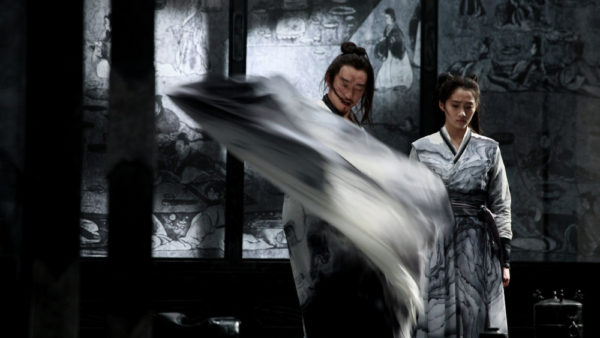Film Review: “Shadow” — The Magical Warrior — Given a Delicate Spin
By Neil Giordano
Zhang Yimou’s return to form is a story of doubles, duplicity — and zithers.
Shadow, directed by Zhang Yimou. Screening at Kendall Square Cinema, Cambridge, MA.

A scene from “Shadow.”
If Chinese master filmmaker Zhang Yimou is still smarting after the mammoth flop of his last film, 2016’s The Great Wall, he’s showing no signs of it. That internationally produced, big-budget mega-bloat of a film will probably be remembered as his Heaven’s Gate, its fault as much overweening ambition as execution (though there’s more good about both films than legend would allow). Tellingly, Zhang’s new film, the moody but triumphant Shadow, dispatches with grandiosity altogether. The director systematically strips his aesthetic down to its base elements: a fine ensemble of young actors, taut storytelling, and beguiling cinematography. For fans of wuxia, the gravity-defying martial arts style he’s made so majestic in his action masterpieces Hero and House of Flying Daggers, Zhang offers more nuanced rewards this time around, serving up a delicate spin on the magical warrior motif, combat tinged with sadness, intrigue, and revenge.
The story is set in 3rd century China, an era of tenuous peace. Chinese box-office star Deng Zhao takes on the dual roles of the noble but scheming Commander Zi and that of his double, or “shadow,” named Jing, a gentle naif plucked by Zi from peasant life to serve him. After having been gravely injured in battle, Zi has hidden himself away in a secret lair at the palace: he is seen only by his wife. The healthy Jing dutifully serves in his place, at the feet of the callow and arrogant young king (Zheng Kai). The monarch, although successful at getting along with the neighboring kingdoms, is obsessed with reclaiming a nearby city controlled by powerful general Yang, the same general who had wounded Zi in the past battle. In hiding, Zi seethes in despair and anger at the king but, through the manipulation of his ‘shadow,’ he sees a way to turn the tables.
Setting up the plot makes for a laborious first act, but the intricate pieces are then set in motion with exquisite pictorial imagination. The ruse of Jing’s hidden identity is revealed (to the careful viewer) via a mellifluous zither duet with Zi’s wife, aborted after Jing claims that he’s out of practice (the real couple peform a passionate duet, in secret, later on). But it is the film’s visuals — a strikingly monochromatic palette instead of director’s usual generous flourishes of vivid color — that compel our attention. Cinematographer Zhao Xiaoding (with the help of digital color correction) evokes the ink brush drawings of early Chinese art: he has created a landscape of brooding, cold grey. The external world, drained of color yet filled with bold contrasts, mirror the growing inner hollowness of the Commander. Over the course of the narrative he is transformed from an admirable warrior, who adores and respects his wife, into a Machiavellian conniver, aching for vengeance against his adversaries. The ink-drawing chiaroscuro also explicitly alludes to the symbolism of yin-yang: it dramatizes the disunity of the Commander’s psychologial turmoil, the nature of doubles (the sharp-tongued Commander and the gentle Jing), and the light and dark that inevitably accompanies a didactic fable. The only color allowed to enter the frame is, of course, red, for blood, which (paradoxically) is the Commander’s only means of escape from his existential exile.
The action set pieces don’t disappoint, though they are scaled back from Zhang’s past grand gestures. The most striking episode comes late in the film, a duel between Jing and Yang on a moving bamboo platform adorned with a large yin-yang — pelting rain pierces the air around the combatants. Elsewhere in Shadow, a ragtag army, cobbled together by Zi, fights with steel umbrellas — which are as beautiful as they are deadly. The balletic motions of the warriors hypnotize the viewer as they subdue Yang’s army.
Perhaps the only notable omission in Shadow is the absence of strong female leads, a key element in so many films in Zhang’s oeuvre. Here, both Zi’s wife and the king’s young and willful sister could have been made more central to the plot; instead, they play ancillary roles. The sister in particular, who seeks her own form of revenge by film’s end, had the potential to be developed into a tasty subplot. Still, these additions might have pushed the movie outside of its carefully calculated limits, and it is these that shape its deft artistry and nuanced calibrations of humanity.
Neil Giordano teaches film and creative writing in Newton. His work as an editor, writer, and photographer has appeared in Harper’s, Newsday, Literal Mind, and other publications. Giordano previously was on the original editorial staff of DoubleTake magazine and taught at the Center for Documentary Studies at Duke University.
